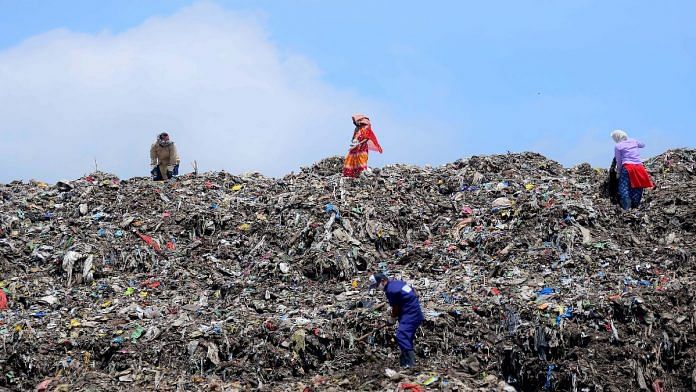New Delhi: Three Indian cities, each located in a different state, have set a major benchmark for the rest of the country when it comes to ideal waste management practices, according to a new NITI Aayog report.
At a time when garbage disposal sites have become a massive problem for most urban centres, Chhattisgarh’s Ambikapur, Maharashtra’s Chandrapur and Kerala’s Taliparamba have adopted a “zero-landfill model” of development, which seeks to phase out dependency on new landfills. This achievement has landed the three cities in a list of 28 with the best waste management practices, mentioned in the report released by NITI Aayog, in collaboration with the Centre for Science and Environment, Monday.
The report was launched in the presence of NITI Aayog vice chairperson Dr Rajiv Kumar, CEO Amitabh Kant, special secretary Dr K Rajeswara Rao, and CSE director general Sunita Narain.
“With rapid population growth in urban areas, capacities of local authorities often fall short of achieving the set goals of urban service delivery. Therefore, sector stakeholders must be equipped with adequate knowledge resources to plan efficient waste management systems,” said Kant at the launch.
According to the report, a zero-landfill model “is based on resource recovery and principles of circular economy” that are socially, environmentally, and economically sound. It identifies a “zero-landfill city” as one that ensures maximum quantities of waste are subjected to scientific treatment and recycling, thus reducing the amount of residual solid waste and minimising the need to construct new landfills.
“It is a holistic and multi-stakeholder approach that ensures that waste is segregated at the source itself, recyclables are extracted and channelized to the recycling industries for various gainful applications, and biodegradable waste is treated in a decentralised manner,” the report says.
On Ambikapur, the report says that with the “intervention of the local administration and women self-help groups” and “inspired by the concept of the Garbage Clinic Model”, the city is now able to achieve 100 per cent segregation, collection and processing of waste.
Also Read: Only 9 per cent of plastic waste is recycled. Seeing its potential as a product can change that
Source segregation: Cities that stood out
Titled ‘Waste-wise Cities: Best practices in municipal solid waste management’, the NITI Aayog report shortlists cities based on 10 parameters: source segregation, biodegradable waste management, material processing, plastic waste management, construction and demolition (C & D) waste management, sanitary waste management, landfill management, technological innovation and e-waste management.
These aspects in particular were chosen because they are part of a “a sustainable value chain” and include practices that other cities can benefit from too.
On source segregation, “a fundamental and non-negotiable condition for a sustainable waste management,” Allappuzha (Kerala), Indore (Madhya Pradesh) and Panaji (Goa) scored highest out of the 28 cities.
The report calls Indore the “number one city in the waste management sector in India”, stating that it has “a robust communications strategy to bring about behavioural change at the mass level”. Its aim to motivate citizens to embrace segregation is backed up by “a robust monitoring system and enforcement through a series of by-laws”. Its success lies in a combination of “source segregation, participation of all stakeholders and good governance”, the report adds.
When it comes to processing materials found in the waste, after it has been collected from the source, Bhopal (Madhya Pradesh), Surat (Gujarat), Jamshedpur (Jharkhand) and Dhenkanal (Odisha) imbibed the best practices, according to the report.
The cities to perform best in plastic waste management were Bicholim (Goa), Gangtok (Sikkim) and Kumbakonam (Tamil Nadu), while North Delhi (Delhi) and Gurugram (Haryana) performed best when dealing with C&D waste.
Sanitary waste: ‘Breaking the taboo’
“Breaking the taboo” around sanitary waste, the city of Karad in Maharashtra has managed to achieve a “100 per cent collection rate” in this category.
Sanitary waste management has been “the least explored and debated of all the streams of solid waste that is generated at the household level”, the report says.
Explaining the modus operandi behind Karad’s success, the NITI Aayog report says that the city administration ensures that sanitary waste “is transported and processed separately in the local Common Biomedical Waste Treatment Facility (CBWTF)”.
“All this was achieved through “minimal investment on infrastructure and higher accountability amongst citizens and city government through a combination of communication and enforcement strategy,” it adds.
Pune too did well in this regard, with the administration currently “in the process of exploring a state-of-the-art technology to make value added products from their sanitary waste”.
The cities of Bobbili (Andhra Pradesh), Mysuru (Karnataka) and Vengurla (Maharashtra) found mention for handling biodegradable waste. Zero waste plants in Mysuru, in particular, scripted its success.
Using tech to solve the problem
Leh (Ladakh) installed a 30 tonne solar waste segregation plant, earning its spot among the cities that use technology to solve waste management. Kakinada (Andhra Pradesh) and Bengaluru (Karnataka) also find place in the list for using ‘Radio Frequency Identification’ for garbage collection.
Keonjhar (Odisha) and Vijaywada (Andhra Pradesh) are also among the cities to use tech in waste management, incorporating real time tracking systems, according to the report.
On innovation and e-waste, the cities to perform best were Paradeep (Odisha), Panchgani (Maharashtra), Thiruvananthapuram (Kerala) and Jamshedpur (Jharkhand).
(Edited by Gitanjali Das)
Also Read: What India can learn from this scenic Kerala town about waste management



